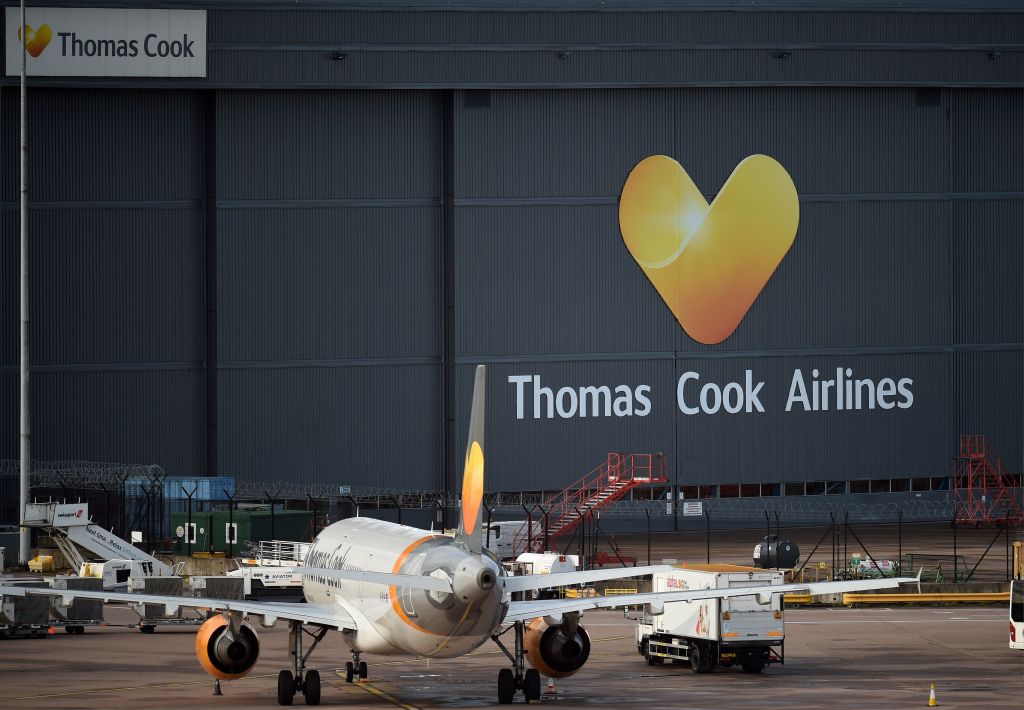Revealed: Why the government bailed out Flybe, but not Thomas Cook

At first glance, some might find it hard to understand why the government decided to save Flybe – a small, regional airline – but not holiday giant Thomas Cook.
After all, when the latter went bust in September more than 150,000 Brits were left stranded abroad, prompting a mammoth repatriation effort by the Civil Aviation Authority.
Read more: Q&A: Why would cutting air passenger duty help Flybe?
But Andrea Leadsom has explained why the government saw Flybe as a company worth saving, but not Thomas Cook.
The business secretary told BBC Breakfast today:
The difference … between Flybe and Thomas Cook was that in the case of Thomas Cook it had huge amounts of debt [so a rescue] simply would have been throwing good money after bad. It was not a viable company.”
The government isn’t in the market to bail out private companies. What we do on a case-by-case basis is look to see whether a business is viable.
In the case of Flybe it is a viable business. There are structural challenges because of the fact that the regional connectivity role that it provides for the UK means that there are some routes that are very tricky.
She added that the government would carry out a review of so-called regional connectivity that “takes into account, for example, our net zero carbon ambitions”.
That will “create a level playing field for all airlines,” she said.

Read more: How Thomas Cook’s collapse caused a rival travel operator to suffer a £25m hit
Downing Street ‘still supports free market’ despite bailout
Downing Street has insisted the government remains committed to free market economics, after it moved to save Flybe from collapse yesterday.
Stressing that the action remained within the EU’s state aid rules that the UK currently abides by, Boris Johnson’s team said that any potential public funding being ploughed into the ailing airline would be carried out on “a strictly commercial basis”.
Asked whether the move was inspired by his recent election success in the North, Johnson’s press secretary added: “It shouldn’t come as a shock that the Prime Minister is concerned about infrastructure and regional connectivity… I don’t think the fact that the PM is very clear on the importance [of these issues] is new.”
He pointed to the government’s decision not to save Thomas Cook as proof that it “hasn’t intervened where the numbers haven’t looked right”.
He added: “The PM is a big supporter of the free market and the free market economy.”
Further underscoring the government’s commitment to the regions, Downing Street confirmed it is considering opening another CCHQ office outside of London, although this is understood to be at a very early stage.
Compared: Flybe and Thomas Cook
Flybe carries roughly the same number of passengers per year – about 8m – as Thomas Cook did in 2018, the year before it went bust.
However, Thomas Cook was also the world’s oldest travel agent, and sold 11m holidays per year.
Meanwhile, Flybe has about 2,400 staff, compared to Thomas Cook’s 21,000 worldwide employees.
Nevertheless, Flybe was kept aloft on Tuesday after the government provided support, thought to involve the deferral of a tax bill worth more than £100m. Had it decided to bail out Thomas Cook, it would have involved handing over £200m to a company which had liabilities of £9bn.
This was on the condition that its shareholders, a consortium including Virgin Atlantic – owned by US giant Delta – agreed to put in tens of millions of pounds.
British Airways bigwig slams airline bailout
However, Willie Walsh, chief executive of the firm which owns British Airways, slammed the decision today.
In a letter to transport secretary Grant Shapps, the International Airlines Group (IAG) boss wrote: “Prior to the acquisition of Flybe by the consortium which includes Virgin/Delta, Flybe argued for taxpayers to fund its operations by subsidising regional routes.
“Virgin/Delta now want the taxpayer to pick up the tab for their mismanagement of the airline,” Walsh said in his letter. “This is a blatant misuse of public funds.”
Read more: Flybe saved from brink of collapse by government deal
“Flybe’s precarious situation makes a mockery of the promises the airline, its shareholders and Heathrow have made about the expansion of regional flights if a third runway is built.”
Flybe connects smaller UK cities such as Southampton and Newcastle and its network of routes includes more than half of UK domestic flights outside London.